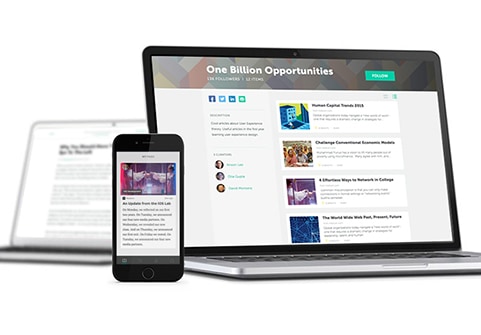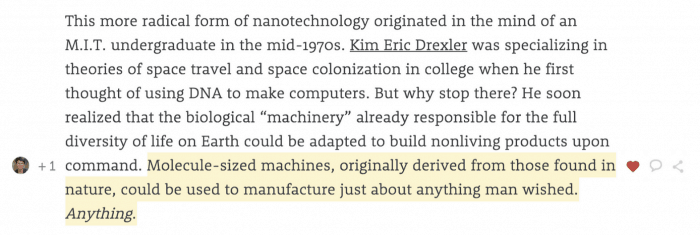Declara: Smart Natural Workflow Learning

We learn by doing. But most tools and training don’t reflect that simple truth.
Declara, a Palo Alto startup, is trying to change that with a family of workflow tools to boost learning and productivity.
Search is great, it’s probably the most important learning tool invented to date, but think about how much time you waste searching for stuff.
Co-founder Nelson Gonzalez said, “We’re reducing time to insight.”
They do that, said co-founder Ramona Pierson, through a “CognitiveGraph.” The, “De-noise content feeds by moving from pull to intuitive push,” Pierson said which means you get useful insights sent to you rather than searching for them.
Core features include 1) a growing number of content collections; 2) curation, annotation and measures of content efficacy; and 3) collaboration.
For example, the paragraph below is from The Nanotechnology Revolution by Adam Keiper. Ramona tagged an insight. I added a like. Share features make it easy to send the insight to your favorite social media. The post sits in a collection of Interesting stuff co-curated by Pierson.
The smarts behind the CognitiveGraph detects patterns and will increasingly be able to push content to users after considering intent, reputation, interest, knowledge, connections. Declara algorithms have been refined over the last four years of contract work, much of it international.
We recently reviewed leading adaptive platforms (Fishtree and Realizeit). They make it easy to create competency-based systems full of little assessment gateways that ensure progress based on demonstrated proficiency. Declara takes a very different approach to personalization, it auto-generates ontologies rather than relying on engineered sequences.
Dynamic learner profiles are key to the CognitiveGraph, your consumption and interaction patterns automagically adjust the push notifications you’ll receive.
Content efficacy. Several content developers have taken notice of Declara’s ability to gain interaction and efficacy data about content down to what gonzalez called “atomic content nodes.”
It’s interesting for content creators to find their content on Declara tagged and rated. Ramona doesn’t anticipate digital rights challenges because they use similar practices to Pinterest, they link back and don’t modify.
Asked if they compete with new media channels like Medium (and Getting Smart), Nelson said Declara is something different, “It’s about interaction around collections collaboratively curated.”
Several mobile apps will be released next week. Newspaper is a customized news feed adjusted by your online behavior. Journeys are shared learning pathways (i.e., watch what smart people read).
The team is experimenting with several potential business models including enterprise learning subscriptions, private content, and recombining content in new and interesting ways.
Several interesting content partners, including WestEd, Red Cross, and the UN, signal how Declara might be used. The Red Cross posted collections on the Nepal earthquake that helped mobilize support.
Backstory. Thirty years ago Ramona Pierson was struck, blinded, and nearly killed by a drunk driver while riding a bike. Her remarkable comeback story after the terrible accident laid the groundwork for a doctoral degree in neuro-clinical psychology. I met Pierson during the four years she spent leading data and evaluation at Seattle Public Schools. She left to a learning data shop called SynapticMash in 2007 which was sold to Promethean in 2010.
I met Nelson when he was leading strategy for a San Francisco foundation in 2008. His background as a journalist, consultant, and philanthropic advisor provided broad base for thinking about learning tools.
In April 2014, Declara raised a $16 million in from GSV Capital, Catamount Ventures, and previous investors Data Collective and Founders Fund, bringing its total funding to $25 million.
For more, check out:







0 Comments
Leave a Comment
Your email address will not be published. All fields are required.